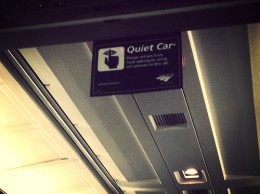The Luxury of Silence

From noise-canceling headphones to the popularity of silent retreats, there has never been quite so great a premium placed on silence. And not only do we value it in a general sense, we’re willing to pay for it. Silence has become the ultimate luxury.
Chloe Schama at the New Republic cites a litany of ways we’re willing to pay a premium for good ol’ peace and quiet. We text instead of call, we stake out the quiet car on Amtrak (and then rage at the people who don’t abide by the rules), we pay more for fancy automobiles that don’t make noise, we live on quiet blocks, and we soundproof conference rooms. My personal favorite: “You can buy John Cage’s 4’33’’ on iTunes.” (omg)
Why has silence become a commodity? To some extent it seems an outgrowth of a back-to-basics, purity-as-priority impulse. Food can’t get from the farm to the table fast enough; toxins must be avoided at all costs; the “disconnectionists” preach digital detox. Absence, in other forms, has become a commodity. How many products advertise their virtues by what they don’t include? BPA-free baby bottles, GMO-free tomatoes, and gluten-free oatmeal — never mind that it didn’t have gluten to begin with — are all available at your local supermarket.
The search for silence might be the extreme extension of the urge to shed modern life’s “noisy” baggage: all those emails, texts, and bits of media — digital, social, etc. — that clutter our consciousness. Noise doesn’t even have to be audible in this modern incarnation; it’s become a particularly catchy symbol of any kind of nuisance. As Jonathan Sterne, author of The Audible Past: Cultural Origins of Sound Reproduction, put it to me, silence has become something like a metaphor for a “utopian state, much like the empty inbox.”
Photo: browpau
Support The Billfold
The Billfold continues to exist thanks to support from our readers. Help us continue to do our work by making a monthly pledge on Patreon or a one-time-only contribution through PayPal.
Comments